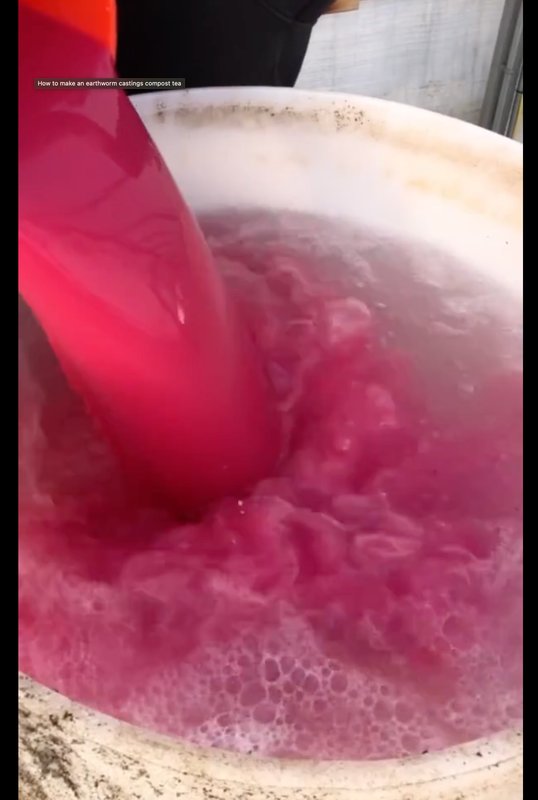Compost teas serve as a dynamic solution for enhancing soil biology, not merely as a nutrient supplement. By agitating soil microbes in an aerobic water environment, compost teas activate vital processes like nutrient cycling and pathogen suppression, ultimately improving soil structure and plant resilience. This practice is deeply rooted in understanding the soil food web, a complex interplay of plants, microbes, and various consumers. From promoting the rhizophagy cycle to filling gaps in soil biology, compost teas provide a cost-effective, sustainable, and regenerative approach to agriculture and gardening.
About the Author: Luna Whitcomb brings 14 years of specialized cultivation experience to the table, with a focus on organic cannabis growth and living soils. Her pioneering work is shaping the future of eco-conscious, cannabis cultivation. For a deep dive into her methodologies, check out The Living Soil Revolution: A Deep Dive with Luna Whitcomb.
Featured Recipe: 50-Gallon Compost Tea Brew
Listen up, here’s how to make a 50-gallon brew of awesome compost tea.
Step 1: The Stuff You Gotta Mix First
Add these before anything else:
- Oat flour: 2.5 cups
- Red beets (blended and strained): 5 lbs
- Soy amino acids (amino): 1 cup
- Gypsum: 2 cups
Step 2: Bring in the Good Bugs
Now add your inoculants:
- Earthworm castings: 2 gallons
- Insect frass: 2 cups
Step 3: Let It Do Its Thing
Let this brew for 36 hours.
Step 4: The Final Touch
Once it’s done, add the following:
- Aloe vera (blended and strained): 5 lbs
The Science Behind Your 50-Gallon Compost Tea Ingredients
In the alchemy of creating a compost tea, understanding the soil food web is pivotal. Every ingredient serves a calculated purpose. So, let’s dissect the role of each in enhancing soil biology.
Pre-Brew Additives
- Oat Flour: A robust source of complex carbohydrates or, scientifically speaking, polysaccharides. This sustains microbial life for longer durations.
- Red Beets: a specific type of polysaccharide that serves as an excellent microbial food source, optimizing bacterial growth.
- Soy Amino Acids: They act as the building blocks for proteins, essentially the ‘bricks’ for microbial cellular structures.
- Gypsum: Adds calcium and sulfur, which modulate soil temperature and bacterial activity.
Inoculants
- Earthworm Castings: A multifaceted inoculant abundant in bacteria, serving as a foundational microbial seed.
- Insect Frass: Adds chitin, a polysaccharide that serves as a food source, also introducing beneficial nematodes and protozoa.
Post-Brew Additives
- Aloe Vera: Introduces an array of beneficial plant compounds and nutrients for bacteria, to be added last and used immediately.
Feeding Your Microbes
Microbes feed on carbohydrates, and here lies the beauty of polysaccharides. Unlike simple sugars that are rapidly consumed, polysaccharides offer a more sustained energy source. This creates a soil biome that’s not just active but enduring.
My favored polysaccharide is inulin, derived from red beets—an insight gleaned during extensive kombucha production. I observed that red beet-infused kombucha exhibited elevated carbonation levels, attributable to the vegetable’s abundant prebiotic content. While inulin is plentiful in nature, another noteworthy source is the Jerusalem artichoke. The practice of extracting polysaccharides from vegetables and plants reduces reliance on purchased carbohydrates, instead encouraging their cultivation with crops. This approach, known as companion planting, has demonstrated boosted yields—particularly when implemented with red beets—according to research.
Temperature Matters: Quick Tips on Water Temperature
As meticulous as we are about ingredients and brewing time, the temperature of the water is often an underestimated factor in brewing compost tea. The water temperature plays a two-fold role: influencing microbial activity and dictating the dissolved oxygen content.
Why 68-75°F?
Target a temperature range of 68-75 degrees Fahrenheit. This range creates an ideal ecosystem for aerobic microbes, which are essential for a balanced soil biome.
Oxygen Content
Temperature has an inverse relationship with dissolved oxygen levels. Warmer water holds less oxygen, whereas colder water can retain more. Considering that our goal is to foster aerobic microbial life, maintaining oxygen levels is crucial. Oxygen is vital for microbial nutrient uptake and overall vitality.
Conclusion
In the realm of soil fertility, compost teas stand out as a blend of art and science. The key to mastery lies in tailoring your brew to your soil’s unique biology. Utilize a microscope for accurate diagnosis and focus on feeding the soil, not just the plants. Temperature also plays a crucial role in microbial activity, so don’t overlook it. Compost teas are more than a gardening technique; they’re a commitment to nurturing an ecosystem right under your feet. This approach brings tangible rewards in plant yield and health.


This is all good, but I would think that most people, indoor growers can’t use a 50gal. recipe
Nicely written recipe for a simple compost tea. Feeding the soil as well as the plants. But.. What’s in your fermenter? 😀 Following your (Luna) posts here, It’s a nice addition to the GPS site.
As always Luna delights of us with another very informative experience, always a very informative read… thanks Luna and greenpoint for all you do.
Absolutely! Here’s a scaled down version of Luna Whitcomb’s 50-gallon compost tea recipe for a 5-gallon brew:
**Step 1: The Stuff You Gotta Mix First**
Add these before anything else:
– Oat flour: 1/4 cup
– Red beets (blended and strained): 1/2 lb
– Soy amino acids (amino): 1/10 cup
– Gypsum: 1/4 cup
**Step 2: Bring in the Good Bugs**
Now add your inoculants:
– Earthworm castings: 1/5 gallon
– Insect frass: 1/5 cup
**Step 3: Let It Do Its Thing**
Let this brew for 36 hours.
**Step 4: The Final Touch**
Once it’s done, add the following:
– Aloe vera (blended and strained): 1/2 lb
Remember, every ingredient plays a crucial role in enhancing soil biology. To get the most out of your compost tea, make sure to maintain a water temperature range of 68-75 degrees Fahrenheit, as this range creates an ideal ecosystem for aerobic microbes.
For more details and tips on brewing compost tea, feel free to check Luna Whitcomb’s full guide on our blog: [Mastering Compost Teas](https://greenpointseeds.com/growing-tips/mastering-compost-teas/)
No info on feeding the soil. Do you feed it fully concentrated or is it diluted with water. Thanks for any additional info
I believe you use it full strength. Hope this helps.